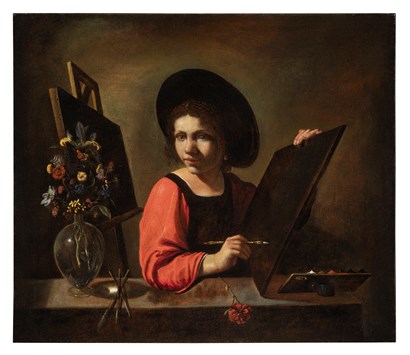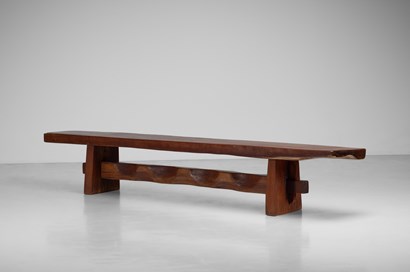This section will be available this Autumn.
_AristideMaillol_T638974992935545933.jpg?width=410&height=2000&qlt=90&scale=both&mode=max&format=jpeg)
Galerie Dina Vierny
aristide maillol
Aristide Maillol (Banyuls-sur-Mer, 1861-1944) Léda, 1901-02 Bronze H 28.3 cm Artist's monogram (on the back of the base) Ambroise Vollard edition from 1902 Foundry Florentin Godard, executed between 1907 and 1937 Provenance: private collection, New York; private collection, London: Galerie Dina Vierny, Paris (acquired from the above in 2025) Litrature: W. George, Les albums d'art Druet, vol. II, Maillol, Paris, 1927, another cast illustrated; J. Rewald, Maillol, Paris, 1939, p. 166 and another cast ill. pp. 110-111 (dated 'circa 1902'); W. George, Aristide Maillol, Berlin, 1965, pp. 137 & 232, another cast ill. p. 137; W. George, Maillol et l'âme de la sculpture, Neuchâtel, 1977, p. 128, another cast and terracotta version ill. pl. 139; B. Lorquin, Aristide Maillol, London, 1995, p. 52, another cast ill. p. 53
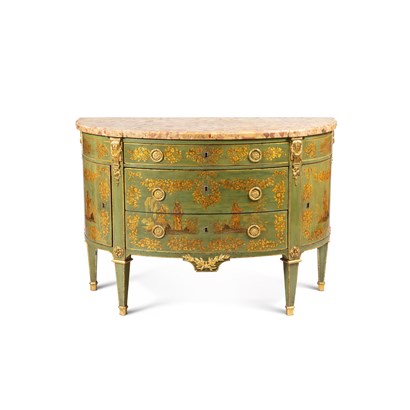
Franck Anelli Fine Art
charles topino
Charles Topino (Arras, circa 1742-1803) Louis XVI period demi-lune commode, circa 1780 Oak, Parisian varnish, gilt-bronze mounts, Aleppo breccia marble top H 91 x W 131 x D 58 cm Stamped 'C. TOPINO' and 'JME', with a CD mark Provenance: private collection, Paris Literature: Forray-Carlier et M. Kopplin, Les secrets de la laque française: Le Vernis Martin, Paris, 2014 This demi-lune commode is decorated with chinoiserie motifs in gold on a green background,. It opens with two side doors and three drawers. The gold chinoiserie decoration on green varnish is quite rare, especially on Louis XVI furniture. The chinoiserie theme is executed here in a decorative style from the 1780s, with framed scenes surrounded by tied garlands. This exotic theme remained in vogue during the Louis XVI period, as evidenced by the lacquered Japanese furniture favoured by Marie-Antoinette, as well as the marquetry furniture by Roentgen. Jean Pillement (1728-1808) popularised chinoiserie designs through his 1776 book 'Œuvres de Fleurs, ornements, cartouches et figures et sujets chinois…etc.,' which spread throughout the courts of Europe. The green varnish décor is especially known for works by René Dubois, such as the small demi-lune commode housed at Waddesdon Manor in England (Inv. WI/23/2). René Dubois, however, was more inclined towards neoclassical scenes, a style that is well-documented in his stock from 1772, which lists around twenty pieces, thus helping to date his production. At this time, the workshop of the Frères Martin was still active, with Jean-Alexandre, the son of Robert Martin, having taken over his father’s workshop in 1767 and acquired that of his cousin Etienne-François in 1772, following his cousin's death the year before. It is clear that Jean-Alexandre benefited from the strong connections his family had with Parisian marchand-merciers and cabinetmakers, one of the most renowned of whom was Charles Topino. This production unfortunately did not survive the French Revolution, and this commode is one of the last examples of this inventive period. Charles Topino settled in Rue du Faubourg Saint-Antoine and counted aristocratic clients and marchand-ébénistes such as Delorme and Tuart amongst his customers. His pieces were described as 'à l'antique,' an expression referring to the neoclassical taste that dominated the late 18th century. His journal, covering the years 1771 to 1779, has survived, providing insight into the names of bronziers who supplied him, including Jean-Baptiste Dubuisson, a master founder since 1765, who created some of the finest bronze mounts of the period. It is known that the gilt bronze mounts adorning Topino’s furniture were cast by Viret, chased by Chamboin and Dubuisson, and gilded by Bécard, Gérard, and Vallet. Charles Topino produced several demi-lune commodes of this type, many decorated with marquetry and several with varnish decorations. Notable examples include: -A commode from the Prince Radziwill collection, sold at the Château d'Ermenonville auction, Ader study, March 8th, 1933 -A writing desk sold by Christie's London from the Rechnitzer collection, May 19th, 1955, illustrated in Connaissance des Arts n° 41, July 15th, 1955 -A writing desk decorated with European black and gold varnish in the Chinese style, sold at Paris’s Hôtel Drouot, Cornette de Saint-Cyr study, January 31st, 1994 -A writing desk with Coromandel lacquer decoration, from the Princess A. de Broglie collection, ill. in P. Verlet, Les ébénistes du XVIIIe siècle français, Connaissance des arts, Hachette, Paris, 1963, p. 268

Van Pruissen Asian Art
yoshitsugu
Hattori Taira Yoshitsugu Yagami School Tsuba with 'Thousand Monkeys' Carved iron Japan, late 18th century Ø 7.1 cm Signed 'Yoshitsugu' An iron tsuba intricately carved in openwork (nikubori ji-sukashi) with a lively multitude of monkeys, including the famous Three Wise Monkeys. Their eyes and the rim are accented in gold using nunome-zōgan. The maker, Hattori Taira Yoshitsugu, was a pupil of Yagami school founder Noda Mitsuhiro and teacher of Onitake Toshiyoshi. The Yagami school, active in Nagasaki in the late 18th century, is renowned for its 'Thousand Monkeys' motif, as also seen in a comparable example in the Metropolitan Museum of Art (inv. n° 91.1.751).

Victor Werner
carl johan bonnesen
Carl Johan Bonnesen (Aalborg 1868-1933 Copenhagen) African elephant, 1924 Bronze with green patina H 54 x W 78 x D 34 cm Signed and dated CARL J. BONNESEN 1924 Provenance: Professor Karl Meyer, board member of Villadsens Fabrikker; donated Nov. 9th, 1932, to the company director Christian Villadsen and his wife Ingeborg (as inscribed on the base); gifted by Christian Villadsen’s grandson to the previous owner
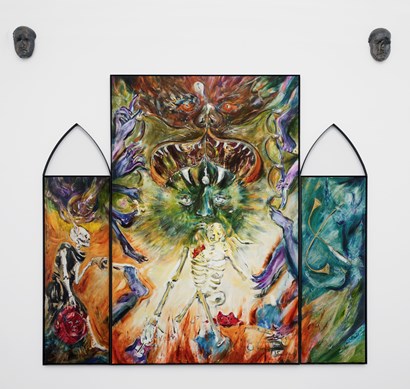
Galerie Nathalie Obadia, Paris/Brussels
joris van de moortel
Joris Van de Moortel (Ghent, 1983) Music enjoys direct access to the soul, has an immediate echo of response since we have music within ourselves, 2025 Oil on linen and artist’s steel frame (3 panels) 200 x 220 cm Provenance: the artist's studio, Belgium Exhibition: Joris Van de Moortel, Le poids du ciel illumine la terre, Galerie Nathalie Obadia, Paris, France, 2025
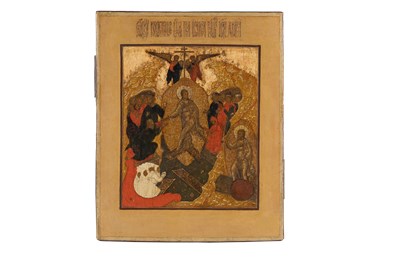
Heutink Ikonen
Anastasis Russia, circa 1600 32.5 x 26.5 cm The Anastasis (resurrection) of Christ and the victory over the realm of death are central to this icon. Christ, surrounded by a radiant mandorla, tramples the gates of the underworld and pulls Adam up from a stone coffin by his wrist. Behind Adam stands John, pointing to Christ with his hand and addressing a group of Old Testament prophets and forefathers. To the right of Christ are Eve, Kings David and Solomon, and the prophet Daniel, amongst others. At the bottom right, Christ can be seen rising from his own tomb
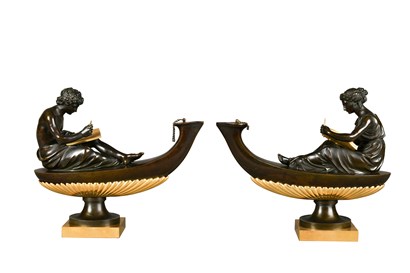
Gallery de Potter d’Indoye
Pair of oil lamps Ormoulu and patinated bronze Embossed gilt bronze and patinated bronze, representing the allegory of Philosophy and Study, each seated on an antique oil lamp, with an edge in gadroon motif, on a square footed base France, Consulat period, circa 1800 H 31 x W 36 cm Based on a model by Louis-Simon Boizot Comparative literature: H. Ottomeyer et P. Pröschel et al., Vergoldete Bronzen, Munich, 1986, vol. I, p. 294, fig. 4.17.1. I, p. 294, fig. 4.17.1. This pair of oil lamps is clearly designed in a neoclassical style, and, more specifically, in the 'Etruscan' style which came into vogue in the 1780s. This style draws its inspiration from antique forms rediscovered in archaeological digs, in particular those at Pompeii and Herculaneum, and manifested in the decorative arts by simple lines and ornamentation inspired by Antiquity. The allegorical figures of Philosophy and Study, which decorate these lamps, are taken from models created by Louis-Simon Boizot (1743-1809), then sculptor for the King. Boizot designed them for the first time in 1780 for a lamp in the antique style. He sold the model to the Sèvres factory, which then reproduced it in biscuit porcelain until 1786. These two figures were also used in the famous clock model, 'To Study and to Philosophy', created based on a drawing by François Rémond for the decorative arts merchant Dominique Daguerre. It is important to note that Pierre-Philippe Thomire (1751–1843), a reputed bronze worker, collaborated with Boizot in Sèvres beginning in 1783, the date when he succeeded Jean-Claude Thomas Duplessis (1730-1783) as the official bronze worker for the factory. The involvement of Thomire in the production of bronzes of this type is widely acknowledged. Comparable oil lamps include: - a pair kept at the J. Paul Getty Museum in Los Angeles (inv. 88.SB.113.1 et 88.SB.113.2), attributed to Thomire; - another from the former collection of Sir Robert Abdy, sold at Christie's London on June 9th, 1994, lot 65,; - a pair offered for sale at Christie's London on December 13th, 2001, lot 430. - finally, a pair presented in the Madame Simone Steinitz collection at Christie's in Paris on June 19th, 2025, Paris lot 126. A drawing attributed to Thomire, kept at the Museum of Decorative Arts in Paris, depicts a very similar lamp placed to the right of a fireplace (cf. J. Bourne et V. Brett, L’art du luminaire, Paris, 1992, p. 156, fig. 530). In addition, two sketches found in an album of drawings analysed by P. Rosenberg and B. Peronnet (Revue de l’Art, n° 142, 2003-2004) bear witness to the distribution and success of these models. They perfectly illustrate the taste for Antiquity, which dominated French decorative arts in the late eighteenth century.
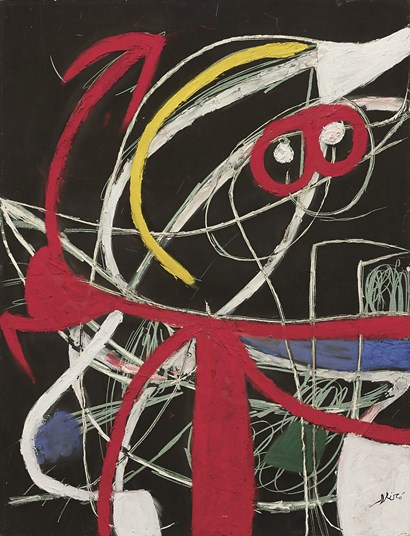
Galerie de la Béraudière
joan miró
Joan Miró (Barcelona 1893-1983 Palma de Majorque) Femme, oiseaux, 1976 Oil, gouache and oil stick on scratched board 65.1 x 50.2 cm Signed lower right 'Miró' Signed, dated and titled on the reverse: MIRÓ., 20/IV/76., Femme, oiseaux Provenance: estate of Joan Miró; Sotheby's, Madrid, 42 works by Joan Miró, 9 December 1986, lot 4 (in aid of the Fundaciò Pilar i Joan Miró, Palma de Mallorca); Quitana Fine Arts, New York; Ramis Barquet Gallery, Mexico City; private collection; Christie's, New York, 9 November 2000, lot 460; Waddington Galleries, London; private collection, Portugal (acquired from the above in 2004); Phillips, New York, 8 November 2015, lot 14; private collection, Europe Literature: Jacques Dupin, Ariane Lelong, Joan Miró, Catalogue raisonné. Paintings, vol. VI: 1976-1981, Paris, Gallery Lelong and the Miró Succession, 2004, ill. n° 1737, p. 49 Exhibitions: 2018, Brussels, Galerie de la Béraudière, Calder, Miró et leurs rencontres parisiennes; 2017, Brussels, Galerie de la Béraudière, La figure animalière; 2016, Brussels, Galerie de la Béraudière, Chefs-d'oeuvre de la galerie et Surréalisme In Woman, Birds, Joan Miró unfolds a free and vibrant universe, where colour and line become forces in motion. Against a deep black background, reds, yellows and whites burst forth with an almost musical intensity. The artist condenses the essence of his language into this work: the spontaneity of gesture, the simplicity of form and the poetry of symbolism. The woman and the bird, emblematic motifs in his work, merge into a space that is both controlled and spontaneous. Created at the end of his life, this composition expresses the supreme freedom of an artist at the height of his powers.
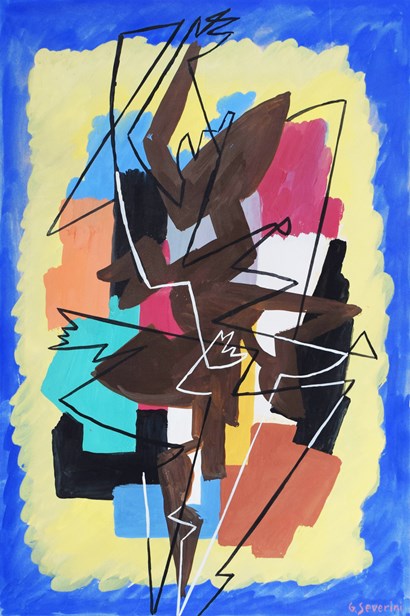
Gilden's Art Gallery
Gino Severini (Italy, Cortona 1883-1966 Paris, France) The dancer, 1959 Tempera painting on wove paper 39.5 x 28.5 cm Signed lower right 'G. Severini' and dedicated in pencil ‘al caro vecchio amico Raffaele Carrieri, affectuoso riccordi di Gino Severini’ [to a dear old friend Raffaelle Carrieri, with affectionate memories, Gino Severini] in the lower right corner The work comes with a photo-certificate of authenticity by Romana Severini Brunori dated 13 May 2025 Provenance: the celebrated poet Raffaele Carrieri (1905-1984); private collection, Milan
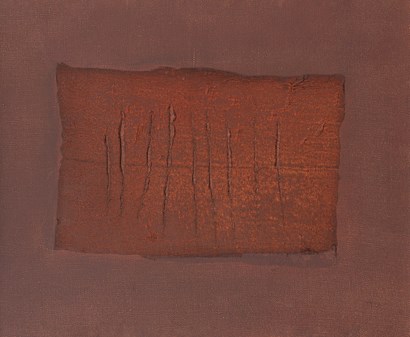
Maurice Verbaet Gallery
Jef Verheyen (Belgium, Itegem 1932-1984 Apt, France) Hommage à Fontana, 1959 Oil, collage on canvas 50 x 60.5 cm Provenance: Hans Liechti, Grenchen; private collection, Switzerland Literature: Willy Van den Bussche and Léonore Verheyen, Retrospective Jef Verheyen 1932–1984 (Ostend/Bruges: PMMK – Provincial Museum of Modern Art / Stichting Kunstboek, 1994), p. 76 Exhibitions: Retrospektive Jef Verheyen 1932-1984, Josef Albers Museum Quadrat, Bottrop, 10 July-4 September 1994; Retrospectieve Jef Verheyen 1932-1984, PMMK Museum voor Moderne Kunst Ostende, 26 March-13 June 1994
__T638925110317245557.tif?width=410&height=2000&qlt=90&scale=both&mode=max&format=jpeg)
Van Pruissen Asian Art
tokuda yasokichi iii
Tokuda Yasokichi III alias Kutani Masahiko (Japan, 1933-2009) Porcelain vase Japan, late 20th century H 29.5 cm Signed ‘Kutani Masahiko’ on the base Literature: Yosai - Tokuda Yasokichi Sakuhinshu (The works of Tokuda Yasokichi), Kodansha 1995, Japan This elegant Kutani porcelain vase by Tokuda Yasokichi III - designated a Living National Treasure in 1997 - exemplifies his groundbreaking approach to traditional ceramic art. The slender, tapering body is enveloped in a rich aubergine glaze, punctuated by a single iridescent blue stripe flowing vertically from the mouth to the base. This striking effect was created using Yasokichi’s innovative saiyū (polychrome overglaze) technique, which brought new luminosity and abstraction to Kutani ware. Born Masahiko, Yasokichi III redefined the possibilities of Kutani ceramics, elevating them into a modern art form. Today, his works are held in leading international museum collections, including the Metropolitan Museum of Art and the British Museum.

Collectors Gallery
Arman (Nice 1928-2005 New York) Capricorn brooch in gold Zodiac collection, 1994 Certificate of authenticity and copy of the artist’s original drawing on the letterhead of the Hôtel Lutetia, where the artist resided and designed the models for this collection Provenance: Galerie Pierre-Alain Challier, successor to Editions Artcurial
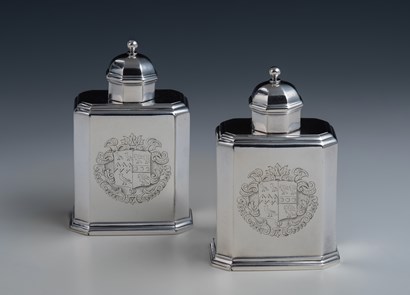
Kunsthaus Kende
Pair of George I Britannia silver tea caddies John Farnell, London, 1720 Engraved sterling silver H 12.5 cm 240.3 g and 237.4 g Provenance: private collection, North America The smooth, octagonal body merging into the correspondingly smooth shoulder. The lid finished with a twisted baluster. The base, which can be pulled out for filling, is only marked with a maker’s mark, the lid is unmarked. The bodies are hallmarked on the underside of the back. The contemporary coat of arms engraved on the front commemorates the marriage of a gentleman of the Dove family (who were based in East Burgholt in the county of Suffolk) and a lady of the Pierse family (whose family was based in Alston in the county of Warwickshire). An attractively preserved, early Britannia silver pair of tea caddies with a beautifully preserved, original surface.

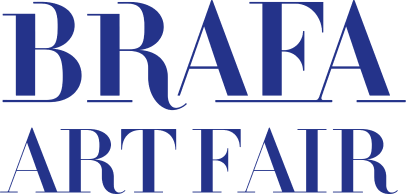

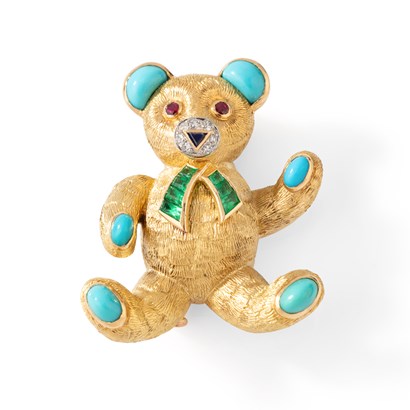
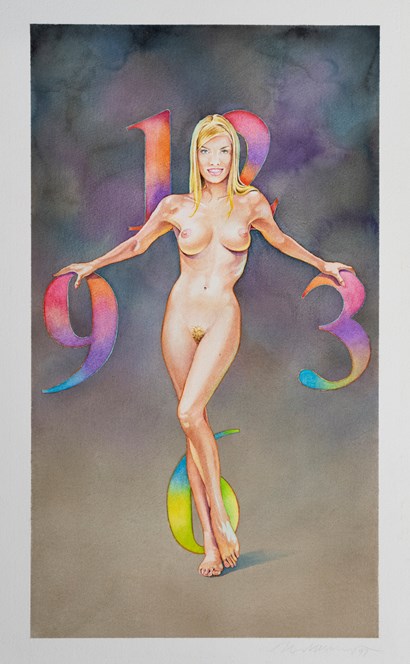



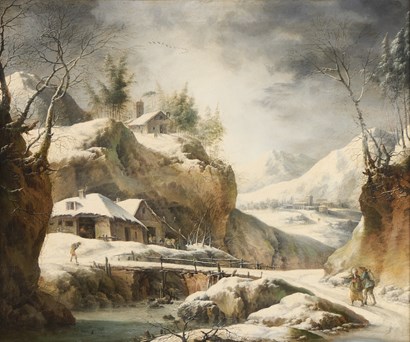


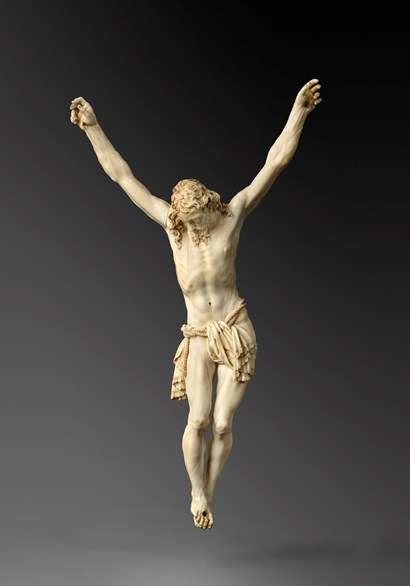

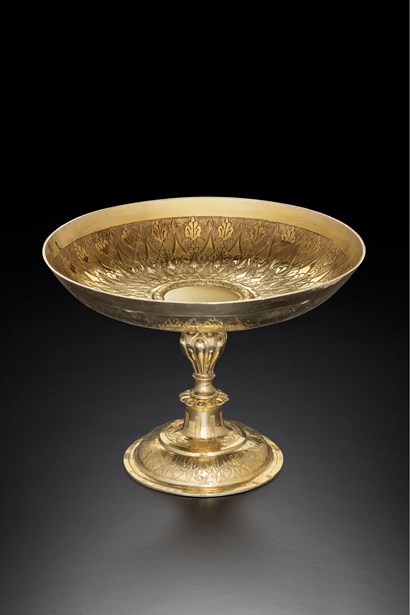
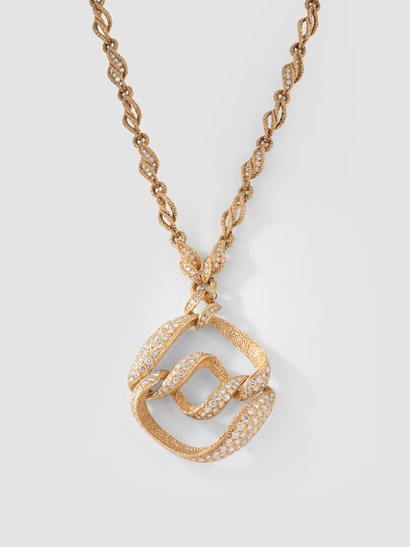
_LaureProuvost_T638925779704509431.jpg?width=410&height=2000&qlt=90&scale=both&mode=max&format=jpeg)
